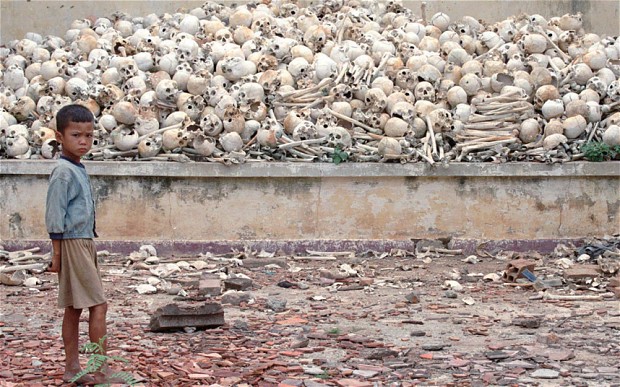|
I recently took a group of tenth graders to Cambodia for a week where they focused on the topic of education within the country and others similar to it. Each day consisted of visiting various sites, performing activities, and having group discussions. A Student Discussion One of the days involved discussing Pol Pot, the genocidal leader of the Khmer Rouge, and the killing fields. The guides we were working with taught the students about the fact that Pol Pot died before any trials could be undertaken to prosecute him and then informed the students that there had been a debate within the country as to whether or not a loyal group of Pol Pot's followers should have been prosecuted as war criminals or left to the local authorities to handle. This conversation began with the students sharing their views and opinions on the topic, but slowly devolved into a couple of students in the group doing most of the talking while the others silently agreed by listening and nodding their heads. The two vocal students essentially agreed on the fact that the men and women should be held accountable through punishment. One believed that the followers should have been left to local authorities and citizens to shame, abuse, and otherwise harass endlessly until their deaths (whether inflicted by the citizenry or not). The second student believed that they should be imprisoned, but not put to death, because they would then be able to live and suffer longer with their own feelings of guilt and shame in their prison cells. No students in the group voiced that they believed the persons should face capital punishment. This seemed to instill and certain sense of pride among themselves for allowing the war criminals to live, rather than be put to death, all the while wishing pain and suffering on them. Ethics and Education As a school trip with five adult educators present at the discussion, I sat listening patiently for the children to give their voice. I love discussions like this and always find it interesting to hear what the students have to say. However, as the agreement came together and the two students took over the conversation for the group, I waited for an adult to say something. None did. As the conversation came to a close, I felt some kind of teaching and learning had to take place. The student consensus was simply not ethical or satisfactory by any modern ethical standards. Choosing to keep someone alive only so they could suffer is sadistic. The impulse is base and of the lowest sort. As the students were all still children, mostly around 15 years old, I completely understood their reactions and conclusions. Revenge seems to be a natural initial impulse for the majority of humans. I didn't and still don't view those kids as bad for such sentiments, just unreflective and perhaps ignorant. They clearly were not able to imagine how anyone could carry out such monstrous acts without being evil people who deserved to be tortured for their sins (something that is still sadly propagated by most western religions). This is where ethics needs to be taught to students. Removal of dangerous people from society is not about sadism, it is about security. All efforts should be made to feel compassion for these men and women and to help reform them where possible. If not, imprisonment is the correct action so that they are not a threat to society. Just because a person has committed heinous crimes does not make them less human or less deserving of compassion. We as third persons have no idea of their personal histories. Whether they were abused as children. Whether they have brain tumors. Whether they've been brainwashed by their socio-cultural environments. Whether they're psychopaths or sociopaths. There are literally hundreds of legitimate psychological and biological explanations for socially malignant behavior. It is this lack of apparent reason or justification for their actions that causes us to leap to blaming them. We assume they are just like us and should therefore act just like us, but that is never the case. The truly human (and humane) thing to do is to extend compassion, not sadism. If every student were to graduate high school with this ability, I would feel the educational system had done its job well and that we could deem it a success. Until then, there is a lot of educating to be done. Further Reading and References
1 Comment
Caitlin
12/12/2014 08:47:49 pm
Really liked this post. Completely agree with your view on this topic. "These people" almost always need compassion. If only more understood that, our world would be very different.
Reply
Leave a Reply. |
Archives
November 2017
|

 RSS Feed
RSS Feed